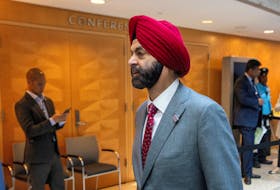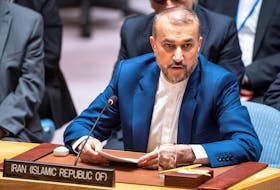These days, patients have a wealth of information at their fingertips, and walk into a doctor’s office wanting details and to talk about options, Dr. Ian Bowmer says.
“Then we superimpose on that the new technologies — the new biotechnologies, artificial intelligence and the ability of computers to really analyze massive amounts of information in seconds,” he said in a recent interview with The Telegram. “The whole of the way that we deliver and provide medical care is really changing, and I think that’s going to be one of the challenges for the Royal College (of Physicians and Surgeons of Canada), how we help our members, who are the specialist practitioners of Canada, adjust to these new practice realities.”
It’s about standardizing techniques and technologies, and making it all work in a way that supports improved patient care throughout the country, while being conscious of cost.
It means a vast collection of considerations for Bowmer, as he moves from the role of president-elect into the president’s chair at the Royal College of Physicians and Surgeons of Canada.
The college is responsible for, among other things, accrediting Canadian university residency programs, and credentialing and tracking the continuing professional development of Canadian doctors.
There are challenges ahead, but the former dean of the Memorial University of Newfoundland (MUN) medical school says he is looking at opportunities as well. He said the college membership needs to continue work to listen to Indigenous colleagues, improve representation and investigate existing gaps (he was asked about the male-female divide in statistics on doctors in surgical specialties, with 71 per cent of surgical specialists in Canada being men and 29 per cent women — compared to family medicine, where 54 per cent of doctors are men versus 46 per cent women).
And then there’s the work with patients, including the incorporation of new technology.
“I think with the new technologies, there’s going to be an opportunity to open up more time with physicians, because some of these technologies will take over some of the routine aspects of care and allow our physicians to spend more time with a patient. I see the opportunity — maybe not tomorrow, of course, but over the coming years — that the relationship between the physician and the patient will be stronger because the patient will need someone who has a holistic view of their needs and the science (background) to interpret some of the things that they’re actually reading about and so on,” he said.
“What I think will happen is patients will want to retain that physician-patient relationship. I’ve always seen that as the most incredible relationship, and something that human beings really need.”
According to numbers released by the Canadian Institute for Health Information earlier this month, there are more doctors working in Canada now than ever before, and nationally the supply of physicians continues to outpace population growth.
At 255 doctors per 100,000 people, Newfoundland and Labrador is topped only by Nova Scotia (at 257) as the province with the most doctors per 100,000 population.
- as has been noted throughout the Saltwire Network’s recent series on the availability of doctors in Atlantic Canada, the issues within the system — for doctors and patients — arise as you look more closely, at the distribution of physicians in rural versus urban areas, variations in job satisfaction for key specialists resulting in turnover, and at the differences in funding models from one area of the country to the next.
At a personal level, Bowmer’s experience in the Canadian medical system runs the gamut from direct work with patients in a clinic setting, to medical education, administration and policy development.
He stepped down as dean at the MUN medical school in St. John’s in 2004 and took leave from the university, while tackling work with the federal government and Health Canada. In 2006, he retired from MUN and went to Ottawa full time, ultimately working with the Medical Council of Canada, assessing medical school graduates and conducting assessments of international graduates looking to work in Canada. He was CEO there until last October.
“I still practiced in St. John’s. I did a bit of consulting for the hospital at one point and then the HIV physician lead in St. John’s left and they asked me if I would help with the (HIV) clinic again and I had the opportunity to come back and see some new patients and some of my old patients, until about three years ago,” he said.
On his election to his role of president of the Royal College, he said he considers it “an incredible honour.”
RELATED STORIES:
DEEP DIVES: Doctor shortage
Drug users, advocates fear federal election may sideline safer opioids policy








